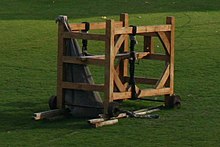springald
English
Pronunciation
Etymology 1
Apparently from spring, with an uncertain final element.
Alternative forms
Noun
springald (plural springalds)
- (now rare, archaic) A youth; a young man, a stripling.
- 1596, Edmund Spenser, The Faerie Queene, V.10:
- There came two Springals of full tender yeares, / Farre thence from forrein land where they did dwell […].
- 1819, Walter Scott, Ivanhoe:
- this same springald, who conceals his name, and despises our proffered hospitality, hath already gained one prize, and may now afford to let others have their turn.
- 1596, Edmund Spenser, The Faerie Queene, V.10:
Etymology 2

Old French espringale; of Germanic origin, akin to English spring.
Alternative forms
Noun
springald (plural springalds)
- (historical) An ancient military engine for launching stones and arrows by means of a spring.
- 2007, Kelly DeVries, Robert Douglas Smith, Medieval Weapons: An Illustrated History of Their Impact, ABC-CLIO (→ISBN), page 138:
- The springald is a somewhat more problematic weapon as it is completely unclear whether it was the same weapon as the Roman ballista which some historians believe never disappeared from the battlefield and remained in use throughout […]
- 2010, Matt Landrus, Leonardo da Vinci’s Giant Crossbow, Springer Science & Business Media (→ISBN), page 54:
- Although generally more powerful than the great crossbow, the springald was not as versatile, since it could not be moved quickly during a siege, nor would it operate properly in wet conditions at sea.
- 2007, Kelly DeVries, Robert Douglas Smith, Medieval Weapons: An Illustrated History of Their Impact, ABC-CLIO (→ISBN), page 138:
Translations
ancient military engine
|